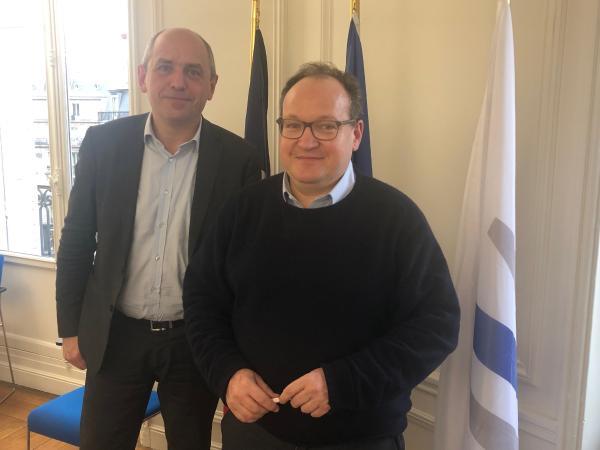
Paul Larrouturou et Ambroise Fayolle pendant leur rencontre
In recent weeks, the debate has escalated in France: Europe must commit to combating climate change and the best way to do this would be to create a climate bank. This proposal is supported ardently and with conviction by two men in particular: the climatologist Jean Jouzel and the economist Pierre Larrouturou, co-authors of the book “Finance, Climat : Réveillez-vous !” (“Climate: Wake Up!”).
They’re right: the European Union fulfils its role when it sets about tackling climate change and helping its Member States to do so. EIB Vice-President Ambroise Fayolle thus met Pierre Larrouturou on Friday 1 February for a frank discussion on this key issue for our future.
This meeting provided an opportunity to reiterate that the EIB has made climate action one of its key areas of activity. Ten years ago, the Bank played a pioneering role on the green bond market by issuing the world’s first “Climate Awareness Bond” (CAB). It currently dedicates at least 25% of its total investment to combating climate change. The EIB is the biggest financier of climate-related investment amongst all multilateral lenders worldwide. And its ambitions are particularly high. In keeping with the commitments made under the Paris Agreement (COP 21), the EIB will invest USD 100 billion in this field by 2020, which will reduce the risks for private investors and prompt greater commitment from them too.
Ambroise Fayolle specifically emphasised the concrete results of these billions. In Cestas in the Gironde department, the EIB has co-financed Europe’s biggest photovoltaic power plant. It has also financed nearly all the tram and metro networks in France’s cities. Furthermore, the EIB is supporting the energy transition of private and public buildings by funding third-party financing companies, which then provide loans accessible to individuals to refurbish their houses and apartments. Contracts already signed are reducing the cost of thermal refurbishments for more than 20 000 households in France. One of the best examples is SPEE in Hauts-de-France which received a EUR 23.5 million loan in 2015 to enable it to lend on attractive terms to individuals refurbishing their homes. The results are spectacular: with a monthly credit refund of EUR 147, households saved around EUR 100 in energy bills each month, not to mention the value added to their property.
In the end, following a lively exchange, Pierre Larrouturou and Ambroise Fayolle agreed on one observation and objective: Europe is already doing a lot, but it can – and must! – do even more. “That is our goal at the EIB”, concluded the Vice-President.